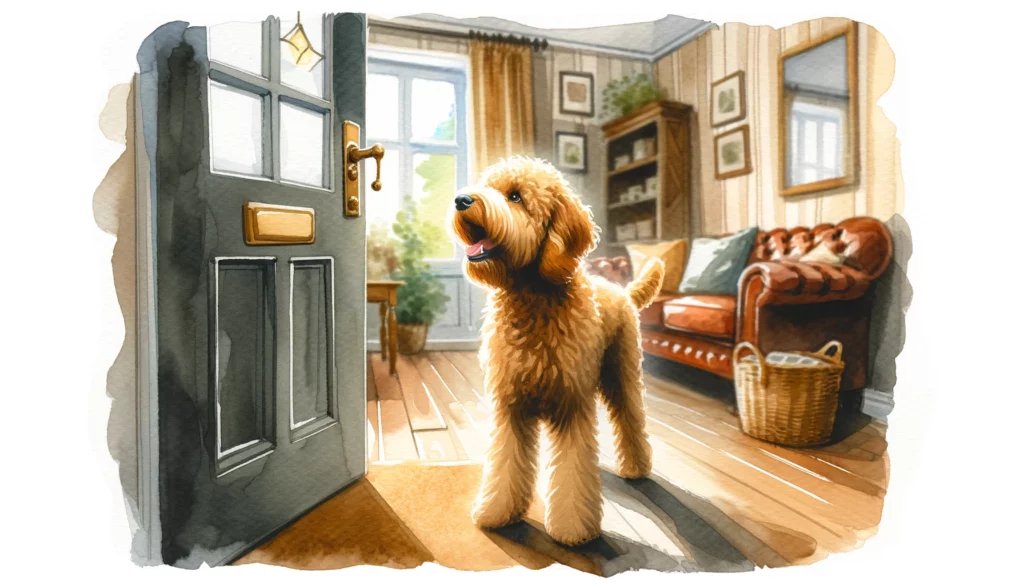This post may contain ads and affiliate links and we may earn a small commission when you click on the links at no additional cost to you. As an Amazon Affiliate, we earn from qualifying purchases. You can read our full disclaimer here.
Why do Goldendoodles Bark a Lot? The Truth Behind Their Barks

Why do Goldendoodles bark a lot? Let’s explore the charming world of these cute furballs, born from the blend of Golden Retrievers and Poodles.
Known for their incredibly friendly and affectionate ways, they sure do love to express themselves with a bark or two. But why is that? Turns out, they have their reasons, just like we do! It’s all about understanding their unique ‘bark language.’
Keeping an eye on the when and why of their barking helps us decode what our Goldendoodle buddies are trying to tell us.
Barking in Goldendoodles can stem from a range of causes, including alerting you to someone at the door, expressing excitement, or demanding attention. Sometimes, it’s a sign of underlying anxiety or boredom. Evaluating the cause is essential in managing this behavior effectively.
If your Goldendoodle is barking excessively, it’s important to assess their environment, daily routines, and overall health to pinpoint the reason behind their vocalizations.
Why Do Goldendoodles Bark A Lot? A Personal Observation

In my own home, I have the joy of living with both a Golden Retriever and a Goldendoodle, which gives me a firsthand perspective on the question, ‘Why do Goldendoodles bark a lot?’
While my Golden Retriever tends to be on the quieter side, the story is quite different with my Goldendoodle.
This delightful, fluffy companion seems to have much more to say, often engaging in barking more frequently than its Golden Retriever sibling. This noticeable difference in their barking habits is not just intriguing but also drives my curiosity.

Is it a unique trait of the Goldendoodle breed, or are there other factors at play? Observing this contrast daily adds a fascinating and lively element to our family dynamics.
Key Takeaways
- Barking in Goldendoodles may indicate various needs or emotions.
- Understanding the context of barking helps in addressing the issue.
- Assessing your dog’s environment and health is crucial for managing barking.
Understanding Goldendoodle Behavior
When considering why Goldendoodles may bark frequently, it’s important to look at their breed characteristics and how they communicate. These factors play a crucial role in their behavior.
Breed Characteristics
Goldendoodle: A mix between a Golden Retriever and a Poodle, this hybrid breed combines traits from both parents. Goldendoodles are known for their high intelligence and sociability.
- Intelligence: Often making them trainable and quick to learn.
- Sociability: Leads to a loyal and affectionate nature; however, they may bark to express their needs or signal their presence.
The genetics of the Goldendoodle affect their temperament, meaning some may be more predisposed to barking than others due to their lineage.
Communication and Emotional Expression
For a Goldendoodle, barking serves as a primary means of communication and expression of their emotions.
- Emotions: Your Goldendoodle’s barking might be an emotional response—indicating excitement, anxiety, or boredom.
- Communication: They use their bark to alert you to potential threats, to get your attention, or as a response to environmental triggers.
Recognizing that their barking is often an intelligent emotional response can help you better understand and manage their behavior.
Why Do Goldendoodles Bark a Lot?
Understanding the common reasons Goldendoodles bark can help you address the behavior effectively. Each category below reveals specific triggers and considerations.
Attention-Seeking and Boredom
Goldendoodles are known for being social and engaging pets, and they may bark to signal their need for attention. If you notice your dog barking more when they’re not engaged in activities, they could be experiencing boredom. A simple response to curb this might be:
- Regular exercise
- Interactive toys
- Consistent training to discourage attention-seeking barks
Fear, Anxiety, and Territorial Behavior
Your Goldendoodle might bark out of fear or anxiety in response to unfamiliar situations or perceived threats. Territorial barking occurs when they feel an intruder is invading their space. Signs your dog is barking due to these emotions can include:
- Tail tucking while barking
- Excessive barking at strangers or other animals
- Increased vigilance in protecting their territory
To limit these reactions:
- Gradually acclimate them to various experiences
- Consider anxiety-reducing techniques or products
For more info about Goldendoodle behaviors, read our post about why Goldendoodles are sometimes clingy.
Health-Related Concerns
Sometimes, a Goldendoodle may bark excessively due to underlying health issues. They might be in pain or suffering from conditions that induce distress.
Be attentive to any changes in barking patterns and seek veterinary advice if you suspect health concerns. Indicators of health-related barking include:
- Barking associated with discomfort when moving
- Changes in appetite or thirst accompanying the change in barking
Environmental Triggers
A variety of environmental factors can trigger barking in Goldendoodles. These may include loud noises such as thunderstorms or fireworks, leading to fear barking. Barks in response to environmental triggers might indicate:
- High sensitivity to specific sounds or sights
- A need to alert their family of potential dangers
Managing environmental triggers involves:
- Providing a safe space during high-stress events
- Using soundproofing or masking techniques to reduce noise impact
Training and Managing Bark Behavior

When it comes to Goldendoodles, a mix between Golden Retrievers and Poodles, understanding and managing their barking habits requires strategic training methods and routines.
The following approaches are designed to help you guide your Goldendoodle towards better bark behavior.
Positive Reinforcement Techniques
To encourage your Goldendoodle to bark less, use positive reinforcement when they are quiet in situations where they would normally bark. Rewards can include treats, praise, or playtime.
This method reinforces their good behavior and increases the likelihood they will repeat it.
- Prompt reward: Give rewards immediately after desired behavior.
- Verbal cues: Pair treats with commands like “quiet” to associate the command with the absence of barking.
Exercise and Mental Stimulation
A well-exercised Goldendoodle is less likely to engage in nuisance barking. Daily physical exercise and mental stimulation are crucial.
- Physical activities: Include walks, runs, or fetch.
- Brain games: Puzzle toys and training exercises provide mental challenges.
No products found.
Routine and Consistency
Establish a routine for your pet that includes regular exercise, feeding, and quiet times. Consistency in your expectations and in responding to barking is key to success.
- Schedule: Stick to a consistent daily schedule.
- Crate training: Use to promote calm behavior when you’re not actively supervising.
Professional Training and Interventions
If your efforts are struggling, consider enlisting a professional dog trainer. They can identify specific barking triggers and offer tailored professional help.
- Behavior modification: A trainer can help modify responses to barking triggers.
- Socialization: Regular exposure to various environments and scenarios can reduce anxiety-related barking.
Health and Comfort Considerations

When considering why Goldendoodles bark a lot, it is crucial to examine their health and the environment they are in. Ensuring they are free from health issues and in a comfortable setting can significantly impact their behavior.
Identifying and Addressing Health Problems
Health Issues: Observing any changes in your Goldendoodle’s barking patterns can be an early indicator of health problems. Consistent or sudden increases in barking may warrant a visit to the veterinarian to rule out or treat any underlying health issues.
Common signs indicating a health problem include:
- Excessive barking combined with visible signs of discomfort
- Changes in barking tone suggesting pain or distress
Vet Consultation: Regular check-ups with a vet can help identify issues like ear infections, dental pain, or other discomforts that can cause your Goldendoodle to bark more frequently. A professional can guide you through:
- Diagnostic tests
- Recommended treatments
- Preventative care measures
Creating a Supportive Environment
Apartment Living: If you’re living in an apartment, it’s important to create a comfortable environment to minimize stress-related barking. Strategies include:
- Providing sight barriers such as curtains to reduce external stimuli
- Using calming treats as a complementary tool to promote relaxation
Shelter and Grooming: No matter the living situation, your Goldendoodle needs a cozy shelter and proper grooming. Ensure they have:
- A quiet, comfortable space to retreat
- Regular grooming to prevent discomfort caused by matting or skin issues
Why Do Goldendoodles Bark a Lot?

Goldendoodles may exhibit a propensity for barking due to their inherited traits from both Poodle and Golden Retriever lineages, as well as their adaptability to various living environments.
This section examines the breed-specific factors contributing to their barking behavior.
Adaptability to Living Spaces
Goldendoodles vary in size, greatly influencing their adaptability to different living spaces. Smaller Goldendoodles may be more suited to apartment living, but regardless of size, these dogs require sufficient space and exercise to mitigate excessive vocalization, which can stem from frustration or pent-up energy.
- Apartment dwellers: Exercise is essential as less space can lead to more barking if your Goldendoodle’s needs are not met.
- House residents: Adequate yard space for play can help in reducing excessive barking.
Understanding the Poodle and Golden Retriever Influence
Goldendoodles are designer dogs, a crossbreed of hypoallergenic Poodles and family-oriented Golden Retrievers. Each breed brings distinct communication habits to a Goldendoodle.
- Poodle: Intelligent and often vocal, Poodles use their bark to communicate, potentially affecting the Goldendoodle.
- Golden Retriever: Known to bark for attention or when they are not sufficiently mentally or physically stimulated.
The blend of these genetics can lead to a Goldendoodle that uses barking as a primary form of communication. Understanding both parent breeds can be key to addressing and reducing unwanted barking in your Goldendoodle.
Why Do Goldendoodles Bark a Lot?

Effective management of excessive barking involves both preventative strategies and targeted behavioral modifications.
By implementing the following measures, you can significantly reduce barking in your Goldendoodle.
Minimizing Barking Through Prevention
Consistent Routine: Establishing a predictable schedule minimizes anxiety and reduces barking triggers. Ensure your Goldendoodle has regular:
- Feeding times
- Exercise periods
- Potty breaks
Mental Stimulation: Keep your dog engaged with:
- Interactive toys
- Training sessions
- Puzzle feeders
Environmental Management: Limit exposure to known barking stimuli by:
- Closing blinds
- Playing background music
- Using white noise machines
Behavioral Modification Techniques
Positive Reinforcement: When your dog is quiet in a usually barking-triggering situation, reward them with:
- Treats
- Praise
- Petting
Counterconditioning: Gradually expose your Goldendoodle to the barking triggers while associating them with positive outcomes such as treats or playtime.
Bark Collars: As a last resort and under professional advice, consider a bark collar that uses vibration or citronella as a deterrent rather than punishment.
By consistently applying these preventative measures and solutions, you can help curb unwanted barking behavior in your Goldendoodle.
Frequently Asked Questions about Why do Goldendoodles Bark a Lot

In this section, you’ll find targeted answers tackling the specific reasons and solutions related to the barking behaviors of Goldendoodles.
What causes excessive barking in Goldendoodles?
Goldendoodles may bark excessively due to boredom, anxiety, or lack of training. They are a breed that craves interaction and stimulation.
Can the breed variation, like being an F1b, affect a Goldendoodle’s barking tendencies?
Yes, breed variation can influence barking. An F1b Goldendoodle, being 75% Poodle, might exhibit different barking patterns due to the traits inherited from the more dominant Poodle genetics.
How do Goldendoodles typically behave around unfamiliar people or animals?
Goldendoodles tend to be friendly, but they may bark at strangers or unfamiliar animals as an alert response or out of excitement.
Are there common triggers that may lead Goldendoodles to bark more frequently?
Common triggers for barking include loud noises, unfamiliar visitors, other animals, or the dog’s own reflection. Each Goldendoodle may have individual triggers as well.
How can one distinguish between normal and problematic barking behaviors in Goldendoodles?
Normal barking is occasional and situation-appropriate, while problematic barking is chronic, disruptive, and occurs without clear triggers.
What are some effective ways to train Goldendoodles to reduce unwanted barking?
You can reduce unwanted barking by providing consistent training, positive reinforcement, sufficient exercise, and mental stimulation to prevent boredom.
Wrapping Up Why Do Goldendoodles Bark a Lot
understanding why Goldendoodles bark more than some other breeds, like Golden Retrievers, is a blend of breed characteristics, individual personality, and possibly the environment they’re in. Each bark of a Goldendoodle could be their way of expressing needs, emotions, or simply their playful nature.
As pet owners, it’s our delightful challenge to listen, understand, and respond to these vocal cues. Embracing this aspect of their behavior not only strengthens our bond with our furry friends but also enriches our lives with their unique and loving personalities.
Remember, every bark has a story, and it’s up to us to tune in!
-

Coffee Mug – In Dog Coffees I’ve Only Had One
Price range: $11.95 through $14.95 Select options This product has multiple variants. The options may be chosen on the product page
